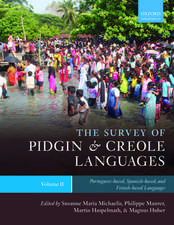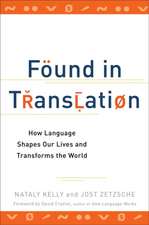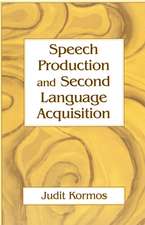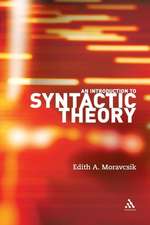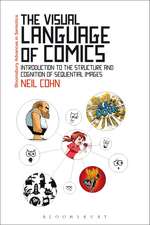Why Do Linguistics?: Reflective Linguistics and the Study of Language
Autor Fiona English, Dr Tim Marren Limba Engleză Paperback – 28 ian 2015
| Toate formatele și edițiile | Preț | Express |
|---|---|---|
| Paperback (2) | 161.76 lei 3-5 săpt. | +41.29 lei 6-12 zile |
| Bloomsbury Publishing – 17 mai 2023 | 161.76 lei 3-5 săpt. | +41.29 lei 6-12 zile |
| Bloomsbury Publishing – 28 ian 2015 | 180.88 lei 3-5 săpt. | |
| Hardback (2) | 469.59 lei 6-8 săpt. | +100.53 lei 6-12 zile |
| Bloomsbury Publishing – 17 mai 2023 | 469.59 lei 6-8 săpt. | +100.53 lei 6-12 zile |
| Bloomsbury Publishing – 28 ian 2015 | 599.66 lei 6-8 săpt. |
Preț: 180.88 lei
Preț vechi: 223.43 lei
-19% Nou
Puncte Express: 271
Preț estimativ în valută:
34.61€ • 37.71$ • 29.17£
34.61€ • 37.71$ • 29.17£
Carte disponibilă
Livrare economică 03-17 aprilie
Preluare comenzi: 021 569.72.76
Specificații
ISBN-13: 9781441166098
ISBN-10: 1441166092
Pagini: 304
Dimensiuni: 156 x 234 x 18 mm
Greutate: 0.45 kg
Editura: Bloomsbury Publishing
Colecția Bloomsbury Academic
Locul publicării:London, United Kingdom
ISBN-10: 1441166092
Pagini: 304
Dimensiuni: 156 x 234 x 18 mm
Greutate: 0.45 kg
Editura: Bloomsbury Publishing
Colecția Bloomsbury Academic
Locul publicării:London, United Kingdom
Caracteristici
Passionately argues for the relevance of linguistics for social justice and teaching.
Notă biografică
Fiona English is Honorary Senior Research Associate at the Centre for Applied Linguistics, IOE, UCL's Faculty of Education and Society, University College London, UK.Tim Marr is Visiting Professor in TESOL and Applied Linguistics at Universidad Icesi, Colombia.
Cuprins
Authors' AcknowledgementsPublisher's AcknowledgementsGeneral IntroductionPart IIntroduction to Part I - Reflective Linguistics1. About Noticing: Becoming a linguistic ethnographer2. About Correctness : What is good language?3. About Belonging : How does language enact community? 4. About Diversity : How do societies organise language?5. About Difference : Do all languages work the same way?Part IIIntroduction to Part II - The Study of Language6. Essential Linguistic Tools7. A Framework for Analysis8. Speaking and Spokenness9. Writing and Writtenness10. Choosing our WordsPart IIIIntroduction to Part III - Why Do Linguistics?11. Translanguaging : When the mixed code is the code12. Myths and Moral Panics? : Linguistics and the public domain13. The Subject That Isn't a Subject : Language at school14. Communicating At The Sharp Edge : Linguistics and the workplace15. So, Why Do Linguistics?ReferencesIndex
Recenzii
The book provides good and inspiring reading on various topics concerning language in social life. ... [I]t covers a broad spectrum ... from linguistic ethnography, correctness, language variety and change, writtenness and spokenness to multilingualism, translanguaging, language myths, language at school and at work - all this with a clear focus on pragmatics and applied linguistics. ... English & Marr strive for linguistic awareness, and they passionately plead for awareness raised towards language in everyday communication. Whoever reads this book, is richly rewarded by a variety of information and stimulating discussions.
[A] lively and thoughtful book ... [in which] readers are asked to think carefully and deliberately about the language we encounter on a daily basis. ... Particularly entertaining examples include the use of the word 'sorry' in British English and the function of small talk across different languages ... English and Marr make it clear from the very start that the aim of this book is "not to teach you linguistics but rather to show what you can do with it". With its emphasis on linguistic mindfulness, this book does just that.
[Why Do Linguistics?] can be used as an introductory overview of an impressive number of concepts. On the other hand, it also offers a good overall review for linguistics enthusiasts who already possess some knowledge of the field ... [and] language teachers in general ... The whole book is cohesive, guiding the reader from specific examples to broader issues in linguistics ... Each chapter offers richly analyzed examples, which effectively illustrate concepts in linguistics ... [making this] a highly readable book ... [T]he authors do accomplish the stated purpose of their book, offering cogent arguments accompanied by illustrative and authentic examples of why we should all do linguistics.
Why Do Linguistics? is an accessible book ... offering plenty of real-world examples, definitions of key terms, opportunities for applications of linguistic frameworks, and even a bit of history.
Why Do Linguistics? is an engaging introduction to the study of language. It covers a wide range of topics in an accessible and lively manner. There are numerous examples from everyday life to illustrate the points being made, all of which highlight the value of taking a deeper look at language issues and what they, in the broader sense, mean. The authors have given us a book that not only explains, but also helps us understand, the complexity of human communications from social, as well as multilingual and intercultural points of view. A very enjoyable book and one that beginning students of linguistics will especially relate to.
Expert 'noticers of language' Fiona English and Tim Marr present a comprehensive and compelling case for the study of language from a social linguistics perspective. From announcements on public transport, to considering whether a shoe is a text they provide a persuasive and detailed explanation of how language is at once messy and systematic. They explore issues of identity, culture, language attitudes and linguistics diversity and convincingly show that linguistics is everywhere. The use of every day examples, including post cards and furniture assembly instructions makes clear the full reach of linguistic analysis and demonstrates that examining the world through a linguistic lens provides new ways of looking and of thinking. This is an engaging book written with verve, and highly recommended for anyone interested in language.
This highly original overview of the field of linguistics answers the question posed by its title in multiple ways - all of them convincing, entertaining and informative. As someone working with secondary school English departments, I was particularly interested in Fiona English and Tim Marr's chapter arguing that language study should be given much more serious consideration in the school curriculum. I couldn't agree more and now feel more empowered than ever to make the case with anyone who might think otherwise. The book is very readable throughout and I would recommend it to anyone with a serious interest in language. I finished more convinced than ever that students at all levels need to do linguistics - and it made me want to do the subject all over again.
This book is very engaging and was a fascinating read, not least because of the wide range of interesting real-life examples.
An informative and engaging introduction . With richly analyzed examples collected from everyday communicative interactions, Fiona English and Tim Marr provide us with new ways of looking at and thinking about the complexity of human communications through a linguistic lens.
[A] lively and thoughtful book ... [in which] readers are asked to think carefully and deliberately about the language we encounter on a daily basis. ... Particularly entertaining examples include the use of the word 'sorry' in British English and the function of small talk across different languages ... English and Marr make it clear from the very start that the aim of this book is "not to teach you linguistics but rather to show what you can do with it". With its emphasis on linguistic mindfulness, this book does just that.
[Why Do Linguistics?] can be used as an introductory overview of an impressive number of concepts. On the other hand, it also offers a good overall review for linguistics enthusiasts who already possess some knowledge of the field ... [and] language teachers in general ... The whole book is cohesive, guiding the reader from specific examples to broader issues in linguistics ... Each chapter offers richly analyzed examples, which effectively illustrate concepts in linguistics ... [making this] a highly readable book ... [T]he authors do accomplish the stated purpose of their book, offering cogent arguments accompanied by illustrative and authentic examples of why we should all do linguistics.
Why Do Linguistics? is an accessible book ... offering plenty of real-world examples, definitions of key terms, opportunities for applications of linguistic frameworks, and even a bit of history.
Why Do Linguistics? is an engaging introduction to the study of language. It covers a wide range of topics in an accessible and lively manner. There are numerous examples from everyday life to illustrate the points being made, all of which highlight the value of taking a deeper look at language issues and what they, in the broader sense, mean. The authors have given us a book that not only explains, but also helps us understand, the complexity of human communications from social, as well as multilingual and intercultural points of view. A very enjoyable book and one that beginning students of linguistics will especially relate to.
Expert 'noticers of language' Fiona English and Tim Marr present a comprehensive and compelling case for the study of language from a social linguistics perspective. From announcements on public transport, to considering whether a shoe is a text they provide a persuasive and detailed explanation of how language is at once messy and systematic. They explore issues of identity, culture, language attitudes and linguistics diversity and convincingly show that linguistics is everywhere. The use of every day examples, including post cards and furniture assembly instructions makes clear the full reach of linguistic analysis and demonstrates that examining the world through a linguistic lens provides new ways of looking and of thinking. This is an engaging book written with verve, and highly recommended for anyone interested in language.
This highly original overview of the field of linguistics answers the question posed by its title in multiple ways - all of them convincing, entertaining and informative. As someone working with secondary school English departments, I was particularly interested in Fiona English and Tim Marr's chapter arguing that language study should be given much more serious consideration in the school curriculum. I couldn't agree more and now feel more empowered than ever to make the case with anyone who might think otherwise. The book is very readable throughout and I would recommend it to anyone with a serious interest in language. I finished more convinced than ever that students at all levels need to do linguistics - and it made me want to do the subject all over again.
This book is very engaging and was a fascinating read, not least because of the wide range of interesting real-life examples.
An informative and engaging introduction . With richly analyzed examples collected from everyday communicative interactions, Fiona English and Tim Marr provide us with new ways of looking at and thinking about the complexity of human communications through a linguistic lens.





